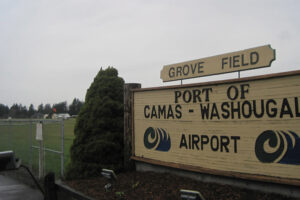When John Spencer first saw the Port of Camas-Washougal’s latest proposed rate increase for Grove Field Airport and Parker’s Landing Marina users, he thought that he might have to reach for some antacids.
“When I first looked at this (proposal),” Spencer said during the commissioners’ June 2 virtual meeting, “I had some serious heartburn.”
Nevertheless, Spencer and fellow commissioners Larry Keister and Cassi Marshall approved the Port’s request to raise its airport and marina lease rates by 10 percent during their virtual meeting on Wednesday, June 16.
Currently, airport hangars range from $220 to $400 per month, and marina slips range from $93.50 to $307.75 per month. Both facilities are 100 percent occupied.
Chief operating officer Kim Noah said during the June 2 meeting that the Port’s current rates compare favorably to other airports and marinas in Southwest Washington and the Portland metropolitan area.


